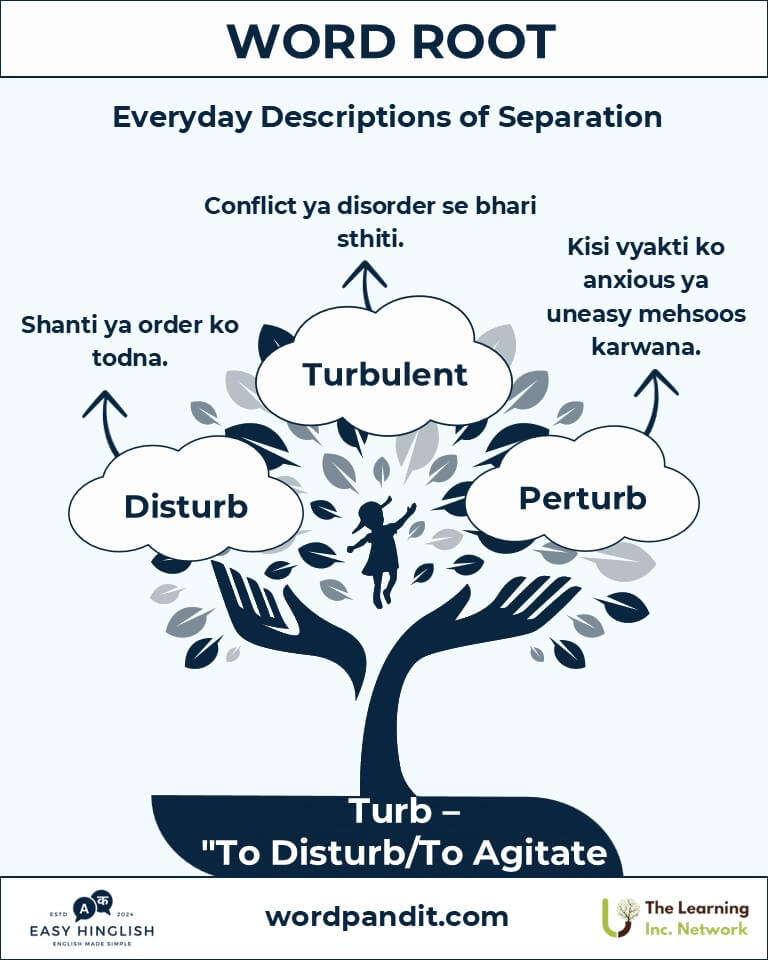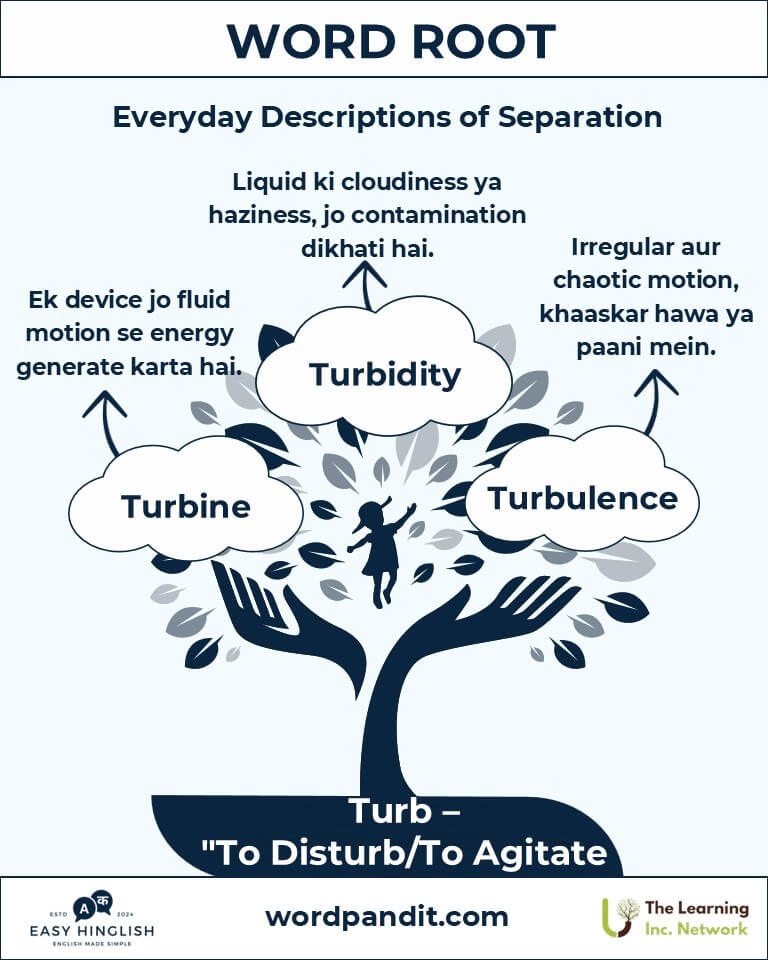Turb: The Power of Disturbance in Language and Action
Turb: The Power of Disturbance in Language and Action
(Turb root ka arth hai "disturb" (व्याकुल्त) ya "agitate" (उत्पीडित). Yeh root un forces ko define karta hai jo shanti ko disturb karte hain aur duniya ko badalte hain.)

Table of Contents
- Introduction: The Essence of "Turb"
- Etymology and Historical Journey
- Mnemonic: Unlocking the Power of "Turb"
- Common "Turb"-Related Terms
- "Turb" Through Time
- "Turb" in Specialized Fields
- Illustrative Story: "Turb" in Action
- Cultural Significance of "Turb"
- The "Turb" Family Tree
- FAQs About the "Turb" Word Root
- Test Your Knowledge: "Turb" Mastery Quiz
- Conclusion: The Living Legacy of "Turb"
1. Introduction: The Essence of "Turb"
English: The root "Turb" (pronounced "turb") comes from the Latin word turba, meaning "disturbance" or "confusion." This versatile root forms the foundation of words describing agitation, chaos, and movement.
हिन्दी: "Turb" शब्द की जड़ (उच्चारण: टर्ब) लैटिन शब्द turba ।

2. Etymology and Historical Journey
English: The word root "Turb" originated from Latin turbare ("to disturb") and turba ("crowd" or "uproar"). Over centuries, it evolved into terms used in English to describe physical and metaphorical agitation.
हिन्दी: "Turb" शब्द की उत्पत्ति लैटिन turbare ("अशांति फैलाना") और
3. Mnemonic: Unlocking the Power of "Turb"
English: To remember "Turb," imagine a stormy sea, with turbulent waves crashing against a sturdy ship.
हिन्दी: "Turb" को याद रखने के लिए एक तूफ़ानी समुद्र की कल्पना करें, जहां उग्र लहरें एक मज़बूत जहाज़ से टकरा रही हैं।
Mnemonic Device: "Turb turns calm seas into chaos."
मेमोनिक डिवाइस: "Turb शांत समुद्र को अराजकता में बदल देता है।"
4. Common "Turb"-Related Terms
- Turbulent (टर्ब्युलेंट): Characterized by conflict or disorder.
Example: "The turbulent winds made the flight extremely challenging."
- Disturb (डिस्टर्ब): To interrupt the peace or order of something.
Example: "Please do not disturb the meeting with unnecessary questions."
- Perturb (पर्टर्ब): To cause worry or unease.
Example: "The sudden news of layoffs perturbed the employees."
- Turbine (टर्बाइन): A device that converts fluid flow into energy.
Example: "The wind turbine generates electricity for the town."
- Turbidity (टर्बिडिटी): The cloudiness or haziness of a fluid caused by particles.
Example: "High turbidity levels in the water indicate possible contamination."
5. "Turb" Through Time
English: "Turbid" was originally used in Medieval times to describe muddy or unclear liquids. Over time, it evolved to represent confusion or murkiness in abstract contexts.
Turbulence in Scientific Renaissance
English: During the Scientific Renaissance, "turbulence" was used to describe chaotic fluid flows, particularly in aviation and meteorology.
हिन्दी: वैज्ञानिक पुनर्जागरण के दौरान, "turbulence" शब्द का उपयोग विशेष रूप से विमानन और मौसम विज्ञान में अशांत तरल प्रवाह (chaotic fluid flow)
6. "Turb" in Specialized Fields
Physics
English: Turbulence describes chaotic, irregular fluid motion.
"Turbulen" (fluid motion)
Engineering
English: Turbines are used in power generation and propulsion.
Environmental Science
English: Turbidity measures water quality and contamination levels.
Psychology
English: Perturbation refers to mental unease or disturbance.
7. Illustrative Story: "Turb" in Action
English: Late one evening, Ella was reading by her window when a sudden storm rolled in. The turbulent winds howled, shaking the shutters and disturbing her peace. Just like the sturdy wind turbine across the field, Ella realized her resilience turned disturbances into energy for growth.
8. Cultural Significance of "Turb"
English: The root "Turb" often symbolizes upheaval and transformation in literature and art. From Shakespeare’s tempestuous storms to political movements, it reflects chaos leading to change.

9. The "Turb" Family Tree
- Tors/Tort (Twist - मरोड़ना): Distort (विकृत करना), Contort
- Agit (Move or Shake - : Agitate , Agitation
- Mob (Move - गति करना): Mobility (गति की क्षमता), Commotion

10. FAQs About the "Turb" Root
Q: "Turb" ka kya matlab hai?
A: "Turb" root Latin shabd "turba" se aya hai, jiska arth hai "disturbance" ya "confusion." Yeh un words ka base hai jo physical, emotional, ya metaphorical agitation ko describe karte hain, jaise "turbulence" aur "disturb."
Q: "Turbulence" sirf aviation mein hi use hota hai?
A: Nahi, "turbulence" aviation ke alawa chaotic fluid flows (jaise ocean currents) aur metaphorical contexts (jaise political ya emotional unrest) ke liye bhi use hota hai.
Q: "Disturb" aur "Perturb" mein kya fark hai?
A: Disturb (डिस्टर्ब): Yeh zyada broad term hai aur physical ya emotional interruptions ke liye use hota hai.
• Perturb (पर्टर्ब): Yeh deep psychological ya emotional unease ko dikhata hai.
Example: "The noise disturbed my sleep." vs. "The strange message perturbed her."
Q: Water quality mein "Turb" kaise relevant hai?
A: "Turbidity" ek shabd hai jo liquid ki cloudiness ya haziness ko measure karta hai, jo water contamination ya poor filtration ko indicate karta hai.
Q: "Turbine" ka origin kya hai aur yeh "Turb" se kaise connected hai?
A: "Turbine" Latin shabd "turbinis" se aya hai, jiska matlab hai "whirl" ya "spinning object." Turbines fluid motion (air, water, ya steam) ka use karke energy generate karti hain, jo Turb root ka motion aur agitation se connection dikhata hai.
11. Test Your Knowledge: "Turb" Mastery Quiz
1. "Turb" ka kya matlab hai?
2. Kaunsa shabd liquid ki cloudiness ko describe karta hai?
3. Kaunsa device fluid flow ko energy mein badalta hai?
4. "Perturb" ka kya matlab hai?
5. Aviation mein kaunsa "Turb" term commonly use hota hai?
12. Conclusion: The Living Legacy of "Turb"
English: "Turb" represents the forces of disruption and transformation, from nature’s chaos to emotional upheavals. It reminds us that disturbance often precedes growth.








